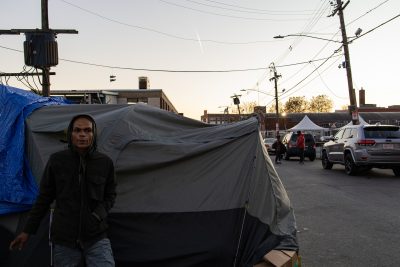
The American Civil Liberties Union of Massachusetts sued the City of Boston Nov. 4 for clearing tents and ordering the unhoused out of the intersection of Massachusetts Avenue and Melnea Cass Boulevard without first identifying affordable housing options for them.
The ACLU of Massachusetts sought legal action after Acting Mayor Kim Janey’s Oct. 19 executive order to remove the homeless encampments by Nov. 1 under the justification of public health and safety resulted in the eviction of many unhoused individuals from their current locations.
The displacement of homeless people was not the goal nor the purpose of the executive order, Janey said in a Nov. 5. press conference.
“I will not respond specifically to ongoing litigation only to say that we will certainly comply with the courts and that our approach has been a public health approach,” Janey said. “We are not asking anyone to remove their property, their belongings or to move off the streets without first identifying a place for them to go that is appropriate.”
Natalia Linos, Executive Director of the François-Xavier Bagnoud Center for Health and Human Rights at Harvard University, said the use of police officers to tackle a public health crisis like Mass/Cass is the incorrect response.
“This is a public health crisis and it’s being addressed through means including coercion, force, incarceration, persecution, which is an inappropriate means,” Linos said. “It was a public health order that was put in place to deny people their freedoms.”
Margaret Sullivan, postdoctoral research fellow also at the FXB Center for Health and Human Rights, worked as a nurse practitioner for people experiencing homelessness. She said she does not believe referring to law enforcement to push unhoused people out of their homes as a public health approach is reasonable.
“I think that getting people housed and into voluntary treatment does not generally require police and law enforcement,” Sullivan said.
She added the difficulties of placing unhoused individuals into shelters are numerous, considering the unwelcoming state of many Boston homeless shelters.
“The state of our shelters and city-run shelters are unsafe,” Sullivan said. “I think that relying on shelters in the current state that they’re in is a really poor way to address what is a long standing problem.”
The ACLU suit cited similar concerns in their legal class action complaint, noting that despite the Mayor’s Office promising transitional housing in their executive order, some unhoused people are displaced by the clearings.
City workers led more than 60 unhoused people to a form of transitional housing and removed more than 24 tents since issuing the executive order, Janey’s most recent statement read. According to the Mayor’s Press Office, the removal is not the same as “sweeps” that occurred in the past.
The ACLU referenced past sweeps in their press release, a practice which consisted of police removing unhoused individuals in the Mass/Cass area, for example the August 2019 “Operation Clean Sweep,” in which 34 arrests were made.
“This work is urgent but should not be confused with ‘sweeps’ conducted in year’s past,” Janey said in the statement. “No person is required to remove or store their tent before shelter, housing, or treatment is available.”
The intersections between COVID-19, housing and opioid use at Mass/Cass require a more holistic public health-based solution, Linos said, adding that she’s “hopeful” Mayor-elect Michelle Wu will take such an approach.
During Janey and Wu’s joint press conference Nov. 3, Wu discussed her plans for tackling the Mass/Cass crisis.
“One of the very first hires that we’re looking to make is to establish a cabinet level position for clear action, leadership and coordination across all of the various entities and agencies involved,” Wu said.
Wu appointed former Massachusetts Department of Public Health commissioner Monica Bharel as the new cabinet senior advisor for tackling issues at Mass/Cass in a press conference Nov. 10.
The Massachusetts Government Department of Public Health declined to comment.





















































































































